- Home
- H. Rider Haggard
She Page 7
She Read online
Page 7
VI
AN EARLY CHRISTIAN CEREMONY
Next morning, at the earliest light of dawn, we rose, performed suchablutions as circumstances would allow, and generally made ready tostart. I am bound to say that when there was sufficient light to enableus to see each other's faces I, for one, burst out into a roar oflaughter. Job's fat and comfortable countenance was swollen out tonearly twice its natural size from mosquito bites, and Leo's conditionwas not much better. Indeed, of the three I had come off much the best,probably owing to the toughness of my dark skin, and to the fact thata good deal of it was covered by hair, for since we had started fromEngland I had allowed my naturally luxuriant beard to grow at itsown sweet will. But the other two were, comparatively speaking, cleanshaved, which of course gave the enemy a larger extent of open countryto operate on, though in Mahomed's case the mosquitoes, recognising thetaste of a true believer, would not touch him at any price. How often,I wonder, during the next week or so did we wish that we were flavouredlike an Arab!
By the time that we had done laughing as heartily as our swollen lipswould allow, it was daylight, and the morning breeze was coming up fromthe sea, cutting lanes through the dense marsh mists, and here and thererolling them before it in great balls of fleecy vapour. So we setour sail, and having first taken a look at the two dead lions and thealligator, which we were of course unable to skin, being destitute ofmeans of curing the pelts, we started, and, sailing through the lagoon,followed the course of the river on the farther side. At midday, whenthe breeze dropped, we were fortunate enough to find a convenient pieceof dry land on which to camp and light a fire, and here we cooked twowild-ducks and some of the waterbuck's flesh--not in a very appetisingway, it is true, but still sufficiently. The rest of the buck's fleshwe cut into strips and hung in the sun to dry into "biltong," as, Ibelieve, the South African Dutch call flesh thus prepared. On thiswelcome patch of dry land we stopped till the following dawn, and, asbefore, spent the night in warfare with the mosquitoes, but withoutother troubles. The next day or two passed in similar fashion, andwithout noticeable adventures, except that we shot a specimen of apeculiarly graceful hornless buck, and saw many varieties of water-lilyin full bloom, some of them blue and of exquisite beauty, though fewof the flowers were perfect, owing to the prevalence of a whitewater-maggot with a green head that fed upon them.
It was on the fifth day of our journey, when we had travelled, so faras we could reckon, about one hundred and thirty-five to a hundred andforty miles westwards from the coast, that the first event of any realimportance occurred. On that morning the usual wind failed us abouteleven o'clock, and after pulling a little way we were forced to halt,more or less exhausted, at what appeared to be the junction of ourstream with another of a uniform width of about fifty feet. Some treesgrew near at hand--the only trees in all this country were along thebanks of the river, and under these we rested, and then, the land beingfairly dry just here, walked a little way along the edge of the river toprospect, and shoot a few waterfowl for food. Before we had gone fiftyyards we perceived that all hopes of getting further up the stream inthe whale-boat were at an end, for not two hundred yards above wherewe had stopped were a succession of shallows and mudbanks, with not sixinches of water over them. It was a watery _cul de sac_.
Turning back, we walked some way along the banks of the other river, andsoon came to the conclusion, from various indications, that it was nota river at all, but an ancient canal, like the one which is to be seenabove Mombasa, on the Zanzibar coast, connecting the Tana River withthe Ozy, in such a way as to enable the shipping coming down the Tanato cross to the Ozy, and reach the sea by it, and thus avoid the verydangerous bar that blocks the mouth of the Tana. The canal before ushad evidently been dug out by man at some remote period of the world'shistory, and the results of his digging still remained in the shape ofthe raised banks that had no doubt once formed towing-paths. Except hereand there, where they had been hollowed out by the water or fallen in,these banks of stiff binding clay were at a uniform distance from eachother, and the depth of the stream also appeared to be uniform. Currentthere was little or none, and, as a consequence, the surface of thecanal was choked with vegetable growth, intersected by little pathsof clear water, made, I suppose, by the constant passage of waterfowl,iguanas, and other vermin. Now, as it was evident that we could notproceed up the river, it became equally evident that we must either trythe canal or else return to the sea. We could not stop where we were,to be baked by the sun and eaten up by the mosquitoes, till we died offever in that dreary marsh.
"Well, I suppose that we must try it," I said; and the others assentedin their various ways--Leo, as though it were the best joke in theworld; Job, in respectful disgust; and Mahomed, with an invocation tothe Prophet, and a comprehensive curse upon all unbelievers and theirways of thought and travel.
Accordingly, as soon as the sun got low, having little or nothing moreto hope for from our friendly wind, we started. For the first hour or sowe managed to row the boat, though with great labour; but after that theweeds got too thick to allow of it, and we were obliged to resort to theprimitive and most exhausting resource of towing her. For two hours welaboured, Mahomed, Job, and I, who was supposed to be strong enough topull against the two of them, on the bank, while Leo sat in the bow ofthe boat, and brushed away the weeds which collected round the cutwaterwith Mahomed's sword. At dark we halted for some hours to rest and enjoythe mosquitoes, but about midnight we went on again, taking advantageof the comparative cool of the night. At dawn we rested for three hours,and then started once more, and laboured on till about ten o'clock, whena thunderstorm, accompanied by a deluge of rain, overtook us, and wespent the next six hours practically under water.
I do not know that there is any necessity for me to describe the nextfour days of our voyage in detail, further than to say that they were,on the whole, the most miserable that I ever spent in my life, formingone monotonous record of heavy labour, heat, misery, and mosquitoes. Allthat dreary way we passed through a region of almost endless swamp, andI can only attribute our escape from fever and death to the constantdoses of quinine and purgatives which we took, and the unceasing toilwhich we were forced to undergo. On the third day of our journey up thecanal we had sighted a round hill that loomed dimly through the vapoursof the marsh, and on the evening of the fourth night, when we camped,this hill seemed to be within five-and-twenty or thirty miles of us. Wewere by now utterly exhausted, and felt as though our blistered handscould not pull the boat a yard farther, and that the best thing thatwe could do would be to lie down and die in that dreadful wilderness ofswamp. It was an awful position, and one in which I trust no other whiteman will ever be placed; and as I threw myself down in the boat to sleepthe sleep of utter exhaustion, I bitterly cursed my folly in ever havingbeen a party to such a mad undertaking, which could, I saw, only end inour death in this ghastly land. I thought, I remember, as I slowly sankinto a doze, of what the appearance of the boat and her unhappy crewwould be in two or three months' time from that night. There she wouldlie, with gaping seams and half filled with fœtid water, which, whenthe mist-laden wind stirred her, would wash backwards and forwardsthrough our mouldering bones, and that would be the end of her, and ofthose in her who would follow after myths and seek out the secrets ofNature.
Already I seemed to hear the water rippling against the desiccated bonesand rattling them together, rolling my skull against Mahomed's, andhis against mine, till at last Mahomed's stood straight up upon itsvertebræ, and glared at me through its empty eyeholes, and cursed mewith its grinning jaws, because I, a dog of a Christian, disturbed thelast sleep of a true believer. I opened my eyes, and shuddered at thehorrid dream, and then shuddered again at something that was not adream, for two great eyes were gleaming down at me through the mistydarkness. I struggled up, and in my terror and confusion shrieked, andshrieked again, so that the others sprang up too, reeling, and drunkenwith sleep and fear. And then all of a sudden there was a flash of coldsteel, and
a great spear was held against my throat, and behind it otherspears gleamed cruelly.
"Peace," said a voice, speaking in Arabic, or rather in some dialectinto which Arabic entered very largely; "who are ye who come hitherswimming on the water? Speak or ye die," and the steel pressed sharplyagainst my throat, sending a cold chill through me.
"We are travellers, and have come hither by chance," I answered in mybest Arabic, which appeared to be understood, for the man turned hishead, and, addressing a tall form that towered up in the background,said, "Father, shall we slay?"
"What is the colour of the men?" said a deep voice in answer.
"White is their colour."
"Slay not," was the reply. "Four suns since was the word brought to mefrom '_She-who-must-be-obeyed_,' 'White men come; if white mencome, slay them not.' Let them be brought to the house of'_She-who-must-be-obeyed_.' Bring forth the men, and let that which theyhave with them be brought forth also."
"Come," said the man, half leading and half dragging me from the boat,and as he did so I perceived other men doing the same kind office to mycompanions.
On the bank were gathered a company of some fifty men. In that light allI could make out was that they were armed with huge spears, were verytall, and strongly built, comparatively light in colour, and nude, savefor a leopard skin tied round the middle.
Presently Leo and Job were bundled out and placed beside me.
"What on earth is up?" said Leo, rubbing his eyes.
"Oh, Lord! sir, here's a rum go," ejaculated Job; and just at thatmoment a disturbance ensued, and Mahomed came tumbling between us,followed by a shadowy form with an uplifted spear.
"Allah! Allah!" howled Mahomed, feeling that he had little to hope fromman, "protect me! protect me!"
"Father, it is a black one," said a voice. "What said'_She-who-must-be-obeyed_' about the black one?"
"She said naught; but slay him not. Come hither, my son."
The man advanced, and the tall shadowy form bent forward and whisperedsomething.
"Yes, yes," said the other, and chuckled in a rather blood-curdlingtone.
"Are the three white men there?" asked the form.
"Yes, they are there."
"Then bring up that which is made ready for them, and let the men takeall that can be brought from the thing which floats."
Hardly had he spoken when men came running up, carrying on theirshoulders neither more nor less than palanquins--four bearers and twospare men to a palanquin--and in these it was promptly indicated we wereexpected to stow ourselves.
"Well!" said Leo, "it is a blessing to find anybody to carry us afterhaving to carry ourselves so long."
Leo always takes a cheerful view of things.
There being no help for it, after seeing the others into theirs Itumbled into my own litter, and very comfortable I found it. It appearedto be manufactured of cloth woven from grass-fibre, which stretched andyielded to every motion of the body, and, being bound top and bottom tothe bearing pole, gave a grateful support to the head and neck.
Scarcely had I settled myself when, accompanying their steps with amonotonous song, the bearers started at a swinging trot. For half anhour or so I lay still, reflecting on the very remarkable experiencesthat we were going through, and wondering if any of my eminentlyrespectable fossil friends down at Cambridge would believe me if I wereto be miraculously set at the familiar dinner-table for the purposeof relating them. I do not want to convey any disrespectful notion orslight when I call those good and learned men fossils, but my experienceis that people are apt to fossilise even at a University if they followthe same paths too persistently. I was getting fossilised myself, butof late my stock of ideas has been very much enlarged. Well, I lay andreflected, and wondered what on earth would be the end of it all, tillat last I ceased to wonder, and went to sleep.
I suppose I must have slept for seven or eight hours, getting the firstreal rest that I had had since the night before the loss of thedhow, for when I woke the sun was high in the heavens. We were stilljourneying on at a pace of about four miles an hour. Peeping out throughthe mist-like curtains of the litter, which were ingeniously fixed tothe bearing pole, I perceived to my infinite relief that we had passedout of the region of eternal swamp, and were now travelling overswelling grassy plains towards a cup-shaped hill. Whether or not it wasthe same hill that we had seen from the canal I do not know, and havenever since been able to discover, for, as we afterwards found out,these people will give little information upon such points. Next Iglanced at the men who were bearing me. They were of a magnificentbuild, few of them being under six feet in height, and yellowish incolour. Generally their appearance had a good deal in common with thatof the East African Somali, only their hair was not frizzed up, but hungin thick black locks upon their shoulders. Their features were aquiline,and in many cases exceedingly handsome, the teeth being especiallyregular and beautiful. But notwithstanding their beauty, it struck methat, on the whole, I had never seen a more evil-looking set of faces.There was an aspect of cold and sullen cruelty stamped upon themthat revolted me, and which in some cases was almost uncanny in itsintensity.
Another thing that struck me about them was that they never seemed tosmile. Sometimes they sang the monotonous song of which I have spoken,but when they were not singing they remained almost perfectly silent,and the light of a laugh never came to brighten their sombre and evilcountenances. Of what race could these people be? Their language was abastard Arabic, and yet they were not Arabs; I was quite sure of that.For one thing they were too dark, or rather yellow. I could not say why,but I know that their appearance filled me with a sick fear of whichI felt ashamed. While I was still wondering another litter came upalongside of mine. In it--for the curtains were drawn--sat an old man,clothed in a whitish robe, made apparently from coarse linen, that hungloosely about him, who, I at once jumped to the conclusion, wasthe shadowy figure that had stood on the bank and been addressed as"Father." He was a wonderful-looking old man, with a snowy beard, solong that the ends of it hung over the sides of the litter, and he hada hooked nose, above which flashed out a pair of eyes as keen as asnake's, while his whole countenance was instinct with a look of wiseand sardonic humour impossible to describe on paper.
"Art thou awake, stranger?" he said in a deep and low voice.
"Surely, my father," I answered courteously, feeling certain that Ishould do well to conciliate this ancient Mammon of Unrighteousness.
He stroked his beautiful white beard, and smiled faintly.
"From whatever country thou camest," he said, "and by the way it mustbe from one where somewhat of our language is known, they teach theirchildren courtesy there, my stranger son. And now wherefore comest thouunto this land, which scarce an alien foot has pressed from the timethat man knoweth? Art thou and those with thee weary of life?"
"We came to find new things," I answered boldly. "We are tired ofthe old things; we have come up out of the sea to know that whichis unknown. We are of a brave race who fear not death, my very muchrespected father--that is, if we can get a little information before wedie."
"Humph!" said the old gentleman, "that may be true; it is rash tocontradict, otherwise I should say that thou wast lying, my son.However, I dare to say that '_She-who-must-be-obeyed_' will meet thywishes in the matter."
"Who is '_She-who-must-be-obeyed_'?" I asked, curiously.
The old man glanced at the bearers, and then answered, with a littlesmile that somehow sent my blood to my heart--
"Surely, my stranger son, thou wilt learn soon enough, if it be herpleasure to see thee at all in the flesh."
"In the flesh?" I answered. "What may my father wish to convey?"
But the old man only laughed a dreadful laugh, and made no reply.
"What is the name of my father's people?" I asked.
"The name of my people is Amahagger" (the People of the Rocks).
"And if a son might ask, what is the name of my father?"
"My name is Billali."
"And whither go we, my father?"
"That shalt thou see," and at a sign from him his bearers startedforward at a run till they reached the litter in which Job was reposing(with one leg hanging over the side). Apparently, however, he could notmake much out of Job, for presently I saw his bearers trot forward toLeo's litter.
And after that, as nothing fresh occurred, I yielded to the pleasantswaying motion of the litter, and went to sleep again. I was dreadfullytired. When I woke I found that we were passing through a rocky defileof a lava formation with precipitous sides, in which grew many beautifultrees and flowering shrubs.
Presently this defile took a turn, and a lovely sight unfolded itselfto my eyes. Before us was a vast cup of green from four to six miles inextent, in the shape of a Roman amphitheatre. The sides of this greatcup were rocky, and clothed with bush, but the centre was of the richestmeadow land, studded with single trees of magnificent growth, andwatered by meandering brooks. On this rich plain grazed herds of goatsand cattle, but I saw no sheep. At first I could not imagine what thisstrange spot could be, but presently it flashed upon me that it mustrepresent the crater of some long-extinct volcano which had afterwardsbeen a lake, and was ultimately drained in some unexplained way. Andhere I may state that from my subsequent experience of this and a muchlarger, but otherwise similar spot, which I shall have occasion todescribe by-and-by, I have every reason to believe that this conclusionwas correct. What puzzled me, however, was, that although there werepeople moving about herding the goats and cattle, I saw no signs of anyhuman habitation. Where did they all live? I wondered. My curiosity wassoon destined to be gratified. Turning to the left the string of littersfollowed the cliffy sides of the crater for a distance of about halfa mile, or perhaps a little less, and then halted. Seeing the oldgentleman, my adopted "father," Billali, emerge from his litter, I didthe same, and so did Leo and Job. The first thing I saw was our wretchedArab companion, Mahomed, lying exhausted on the ground. It appeared thathe had not been provided with a litter, but had been forced to run theentire distance, and, as he was already quite worn out when we started,his condition now was one of great prostration.
On looking round we discovered that the place where we had halted wasa platform in front of the mouth of a great cave, and piled upon thisplatform were the entire contents of the whale-boat, even down to theoars and sail. Round the cave stood groups of the men who had escortedus, and other men of a similar stamp. They were all tall and allhandsome, though they varied in their degree of darkness of skin, somebeing as dark as Mahomed, and some as yellow as a Chinese. They werenaked, except for the leopard-skin round the waist, and each of themcarried a huge spear.
There were also some women among them, who, instead of the leopard-skin,wore a tanned hide of a small red buck, something like that of theoribé, only rather darker in colour. These women were, as a class,exceedingly good-looking, with large, dark eyes, well-cut features, anda thick bush of curling hair--not crisped like a negro's--ranging fromblack to chestnut in hue, with all shades of intermediate colour. Some,but very few of them, wore a yellowish linen garment, such as I havedescribed as worn by Billali, but this, as we afterwards discovered, wasa mark of rank, rather than an attempt at clothing. For the rest, theirappearance was not quite so terrifying as that of the men, and theysometimes, though rarely, smiled. As soon as we had alighted theygathered round us and examined us with curiosity, but withoutexcitement. Leo's tall, athletic form and clear-cut Grecian face,however, evidently excited their attention, and when he politely liftedhis hat to them, and showed his curling yellow hair, there was a slightmurmur of admiration. Nor did it stop there; for, after regarding himcritically from head to foot, the handsomest of the young women--onewearing a robe, and with hair of a shade between brown andchestnut--deliberately advanced to him, and, in a way that would havebeen winning had it not been so determined, quietly put her arm roundhis neck, bent forward, and kissed him on the lips.
I gave a gasp, expecting to see Leo instantly speared; and Jobejaculated, "The hussy--well, I never!" As for Leo, he looked slightlyastonished; and then, remarking that we had clearly got into a countrywhere they followed the customs of the early Christians, deliberatelyreturned the embrace.
Again I gasped, thinking that something would happen; but, to mysurprise, though some of the young women showed traces of vexation, theolder ones and the men only smiled slightly. When we came to understandthe customs of this extraordinary people the mystery was explained. Itthen appeared that, in direct opposition to the habits of almost everyother savage race in the world, women among the Amahagger are not onlyupon terms of perfect equality with the men, but are not held to them byany binding ties. Descent is traced only through the line of themother, and while individuals are as proud of a long and superior femaleancestry as we are of our families in Europe, they never pay attentionto, or even acknowledge, any man as their father, even when their maleparentage is perfectly well known. There is but one titular male parentof each tribe, or, as they call it, "Household," and he is its electedand immediate ruler, with the title of "Father." For instance, the manBillali was the father of this "household," which consisted of aboutseven thousand individuals all told, and no other man was ever calledby that name. When a woman took a fancy to a man she signified herpreference by advancing and embracing him publicly, in the same way thatthis handsome and exceedingly prompt young lady, who was called Ustane,had embraced Leo. If he kissed her back it was a token that he acceptedher, and the arrangement continued until one of them wearied of it. Iam bound, however, to say that the change of husbands was not nearly sofrequently as might have been expected. Nor did quarrels arise outof it, at least among the men, who, when their wives deserted themin favour of a rival, accepted the whole thing much as we accept theincome-tax or our marriage laws, as something not to be disputed, and astending to the good of the community, however disagreeable they may inparticular instances prove to the individual.
It is very curious to observe how the customs of mankind on this mattervary in different countries, making morality an affair of latitude, andwhat is right and proper in one place wrong and improper in another. Itmust, however, be understood that, since all civilised nations appear toaccept it as an axiom that ceremony is the touchstone of morality, thereis, even according to our canons, nothing immoral about this Amahaggercustom, seeing that the interchange of the embrace answers to ourceremony of marriage, which, as we know, justifies most things.

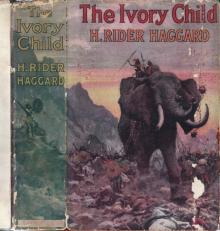 The Ivory Child
The Ivory Child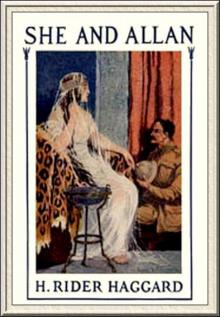 She and Allan
She and Allan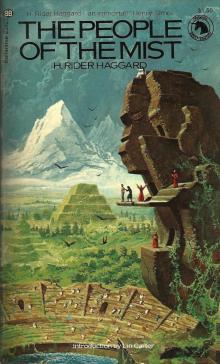 The People of the Mist
The People of the Mist She
She Morning Star
Morning Star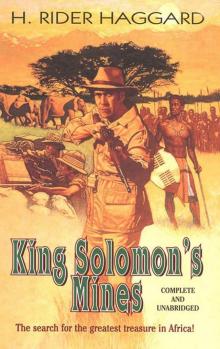 King Solomon's Mines
King Solomon's Mines She: A History of Adventure
She: A History of Adventure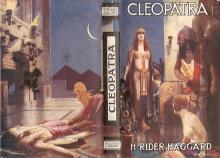 Cleopatra
Cleopatra Ayesha, the Return of She
Ayesha, the Return of She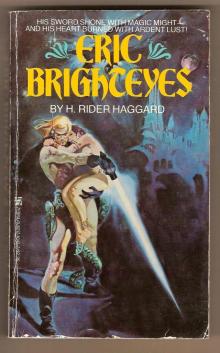 Eric Brighteyes
Eric Brighteyes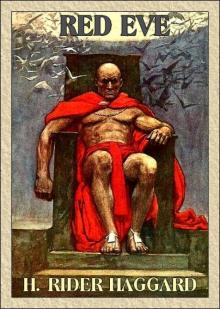 Red Eve
Red Eve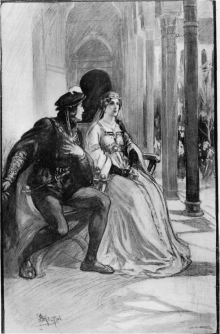 Fair Margaret
Fair Margaret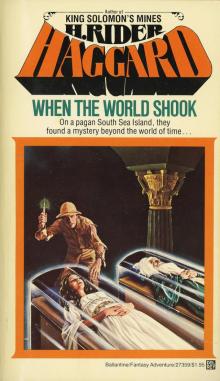 When the World Shook
When the World Shook Lysbeth, a Tale of the Dutch
Lysbeth, a Tale of the Dutch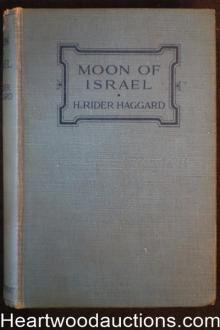 Moon of Israel: A Tale of the Exodus
Moon of Israel: A Tale of the Exodus Long Odds
Long Odds The Ghost Kings
The Ghost Kings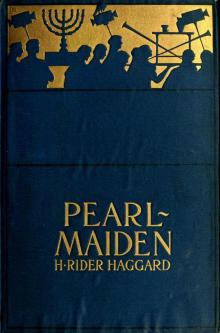 Pearl-Maiden: A Tale of the Fall of Jerusalem
Pearl-Maiden: A Tale of the Fall of Jerusalem Allan and the Holy Flower
Allan and the Holy Flower Smith and the Pharaohs, and other Tales
Smith and the Pharaohs, and other Tales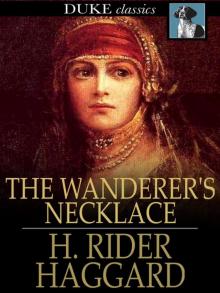 The Wanderer's Necklace
The Wanderer's Necklace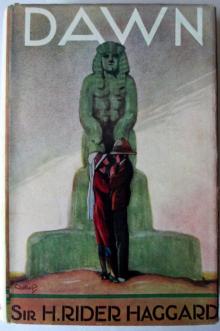 Dawn
Dawn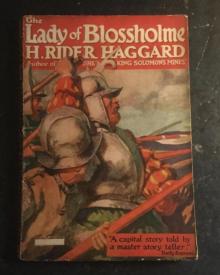 The Lady of Blossholme
The Lady of Blossholme Stella Fregelius: A Tale of Three Destinies
Stella Fregelius: A Tale of Three Destinies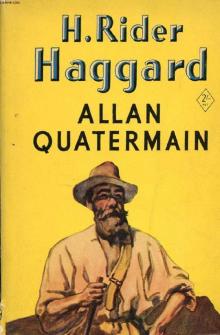 Allan Quatermain
Allan Quatermain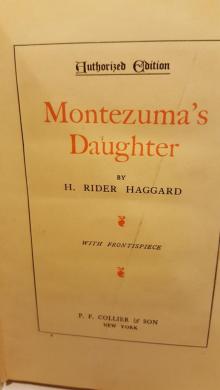 Montezuma's Daughter
Montezuma's Daughter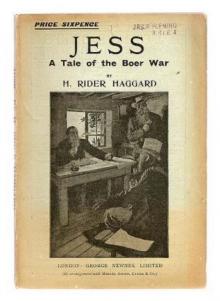 Jess
Jess The Brethren
The Brethren Allan's Wife
Allan's Wife Child of Storm
Child of Storm Queen Sheba's Ring
Queen Sheba's Ring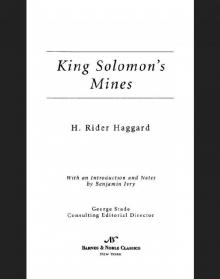 King Solomon's Mines (Barnes & Noble Classics Series)
King Solomon's Mines (Barnes & Noble Classics Series)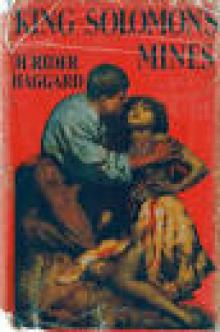 Complete Allan Quatermain Omnibus - Volumes 1 - 10
Complete Allan Quatermain Omnibus - Volumes 1 - 10